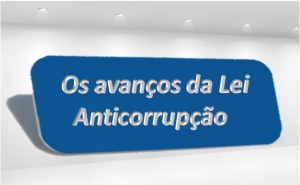Advances in anti-corruption law
 O jornal Valor Econômico held on May 7, in São Paulo, the Anti-Corruption Law seminar, on the new rules that regulated law 12.846 / 2013. Experts and authorities discussed topics such as leniency agreements, integrity programs ("compliance"), overlapping laws and the effects of a possible breakdown of large companies involved in corruption scandals.
O jornal Valor Econômico held on May 7, in São Paulo, the Anti-Corruption Law seminar, on the new rules that regulated law 12.846 / 2013. Experts and authorities discussed topics such as leniency agreements, integrity programs ("compliance"), overlapping laws and the effects of a possible breakdown of large companies involved in corruption scandals.
The main points discussed at the event are as follows:
The regulation of the law
The chief minister of the Federal Comptroller General (CGU), Valdir Simão, explained five aspects of the regulation of the law: 1. What will be the role of the CGU in investigating suspected corruption in federal public bodies; 2. How the value of fines will be calculated; 3. What are the conditions and rules for leniency agreements; 4. How integrity programs can reduce sentences; and 5. How will the registrations of reputable companies work. Details of the presentation are available at CGU website. The minister was optimistic. "We are experiencing a virtuous moment in the fight against corruption in Brazil," he said.
Legal overlap
In his presentation, the attorney general of the Union, Luís Inácio Adams, also said that the moment is favorable to a profound change in the country. But he drew attention to the risk of legal uncertainty due to the overlapping of bodies and laws dealing with corruption, such as the law of administrative improbity, Cade (Administrative Council for Economic Defense), Coaf (Council for the Control of Financial Activities) , Enccla (National Strategy to Combat Corruption and Money Laundering), the Public Prosecutor's Office, CGU and the Union's Attorney General (AGU). According to Adams, there is a risk of creating a "Babel of places that do not understand". He believes that resolving this overlap will be a fundamental step towards reducing corruption in Brazil.
Systemic risk of company breakdown
The attorney general of the Union also discussed the role of the state in relation to the risk of bankruptcy for companies involved in corruption cases. In Adams' assessment, in 99% of the cases being investigated, there is a real risk that punishments will bankrupt companies, with effects not only on their controllers, but also on employees, minority partners and suppliers. He recommends that law enforcement punishes controllers and other officials, but seeks to preserve the institution. "The survival of companies must be a concern of the State," he said.
Enhancing compliance
CGU's Secretary of Transparency and Corruption Prevention, Patrícia Audi, highlighted the importance that the new legislation gives to companies' integrity programs. "Not 'compliance' for English to see," he said. To bring benefits, according to her, it is necessary to prove that the program meets requirements such as facilitating reporting channels, protecting anonymity and being applied to all hierarchical levels. The Secretary for Transparency and Corruption Prevention said that CGU is preparing a document with guidelines for effective compliance in order to guide companies. She also announced the reformulation of the Pro-Ethical Company Register, which values companies committed to preventing and fighting corruption. The initiative is a partnership between CGU and civil society entities, including the ETCO-Brazilian Institute of Ethics in Competition. More details about the project are available at this address.
Other topics covered
Federal judge Fausto De Sanctis spoke of other important legal milestones of the past few years, such as the money laundering law and the institution of award-winning pleading.
Prosecutor Roberto Livianu, president of the Movement for the Democratic Public Ministry, defended the participation of the Public Ministry in the negotiation of leniency agreements.
Criminalist Augusto de Arruda Botelho, president of the Institute for the Defense of the Right to Defense, criticized the use of pre-trial detention as an instrument to enforce the complaint.
The Secretary of International Legal Cooperation of the Federal Prosecutor's Office, Vladimir Aras, recalled the importance that the awarded plea had in the fight against the Italian mafia in Operation Clean Hands.
Lawyer Isabel Franco, partner at Kla-Koury Lopes Advogados, recalled that, as of the new law, companies are now effectively held responsible for acts of corruption practiced on their behalf by third parties. "They must now be much more careful when hiring dispatchers and even lawyers," he said.
The president of the São Paulo Lawyers Association, Leonardo Sica, stressed the importance of fighting also what he called the “corruption subculture”, which makes many people justify illegal acts as part of the customs in Brazil.
The event ended with a lecture by Victor Hou, partner at the international law firm Cleary Gottlieb Steen & Hamilton, who outlined a worldwide panorama of the fight against corruption.
This was the second seminar that the Valor Econômico carried out on the new anti-corruption law. The first took place in August last year and was sponsored by ETCO, which is preparing to launch a book on the points covered in that event.



